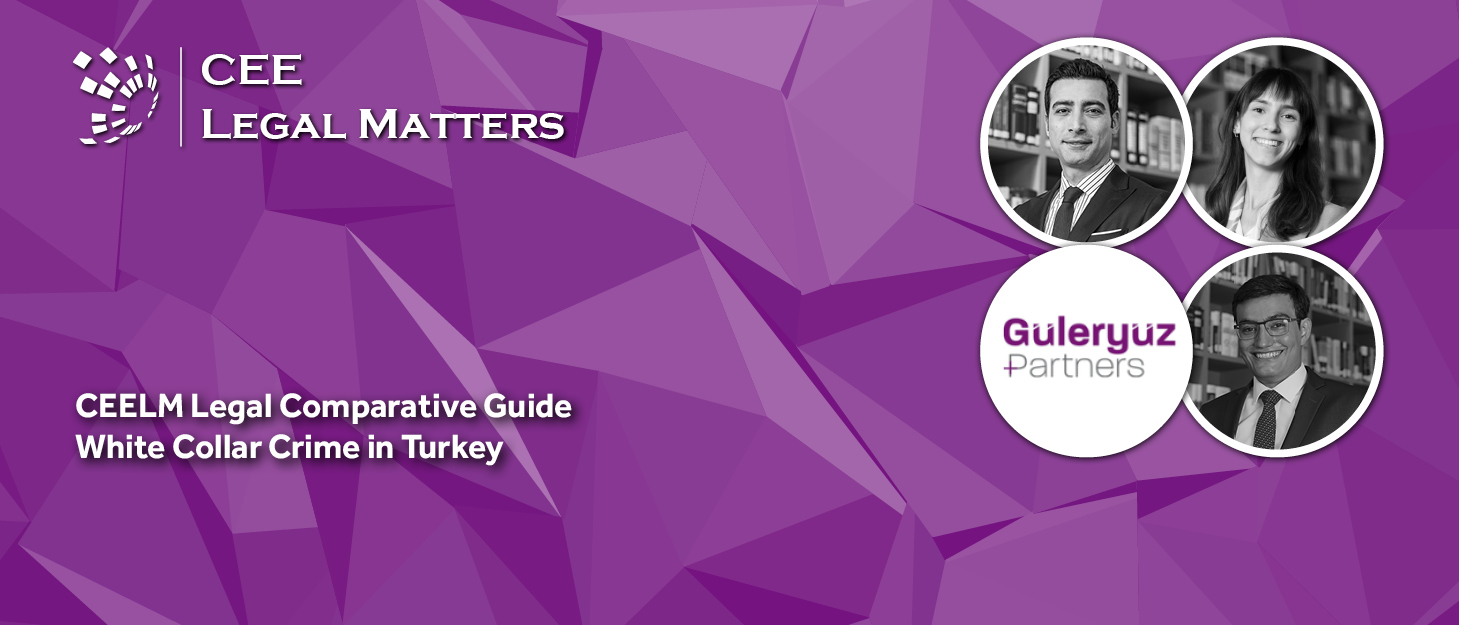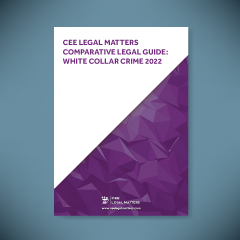Contributed by Guleryuz & Partners.
1. Legal Framework
1.1. What is the legal framework for bribery and corruption in your jurisdiction?
The Turkish Penal Code no. 5237 is the primary source regarding bribery and corruption. In addition to provisions of the Turkish Penal Code on bribery and corruption, some other legislations such as the Capital Markets Law no. 6362 or the Public Officials Law no. 657 contain regulations on this subject.
Furthermore, the Law Against Corruption, Bribery and Declaration of Property no.3628 regulates procedural rules for bribery and corruption crimes. The code compels some persons such as elected public officials, notaries, certified public accountants, political party leaders, and newspaper owners to declare their properties periodically.
1.2. Which international anti-corruption conventions apply?
Turkey is a party to a number of international conventions regarding anti-corruption. Accordingly,
- the United Nations Convention Against Corruption dated 2003,
- the OECD Convention on Combating Bribery of Foreign Public Officials in International Business Transactions dated 1997,
- the Council of Europe Criminal Law Convention on Corruption, and
- the Council of Europe Civil Law Convention on Corruption are applicable. Also, the below is a list of anti-corruption-related conventions to which Turkey is a party:
- the United Nations Convention against Transnational Organized Crime,
- the Convention on the Transfer of Sentenced Persons,
- the Council of Europe Convention on Laundering, Search, Seizure and Confiscation of the Proceeds from Crime and on the Financing of Terrorism,
- the European Convention on Mutual Assistance in Criminal Matters,
- the European Convention on the Suppression of Terrorism,
- the Council of Europe Convention on Laundering, Search, Seizure and Confiscation of the Proceeds from Crime,
- the European Convention on the International Validity of Criminal Judgments, and
- the European Convention on the Transfer of Proceedings in Criminal Matters.
1.3. What is the definition of bribery?
Bribery is defined as securing an undue advantage to a public official or another person indicated by the public official, directly or through other persons, to perform or not to perform a task regarding their duty. A public official who secures an undue advantage to himself or another person he/she indicates shall be sentenced to the same penalty. Where the parties agree upon a bribe, they shall be sentenced as if the offense were completed. In the case where the bribe offer is not accepted, the penalty to be imposed on the offeror shall be reduced by half.
1.4. Is private sector bribery covered by law? If yes, what is the relevant legislation?
In principle, at least one public official must be involved in the act of bribery. The exception to this is stipulated in Article 252/8 of the Turkish Penal Code. As per paragraph 8 of Article 252, an act is punished as bribery if the representatives of the below-listed legal bodies are involved, even if they are not public officials:
- Professional organizations with public institution status;
- Companies formed in association with public bodies or professional organizations with public entity status;
- Foundations that are part of public entities or professional organizations that are public entities;
- Public benefit associations;
- Cooperatives; or
- Publicly-held joint-stock companies.
In addition, if persons listed in the Law Against Corruption, Bribery and Declaration of Property no. 3628 (see Section 1.1) acquire property illegitimately or conceal their property, these persons are sentenced to imprisonment from three years to five years and fined between TRL 5 million (approximately EUR 300,000 as of May 19, 2022) and TRL 10 million (approximately EUR 600,000 as of May 19, 2022).
1.5. What is the definition of a public official and a foreign public official? Are employees at state-owned or state-controlled enterprises treated differently? Are there official lists of public officials, offices, or state-owned or state-controlled enterprises?
Any individual who is elected, appointed, or chosen in any other way to carry out a public duty for a temporary, permanent, or explicitly defined period is considered a public official according to Article 6 of the Turkish Penal Code. Employees at state-owned enterprises are also treated as public officials (see Section 1.4.). However, there is not an official list of public officials, offices, or state-owned or state-controlled enterprises.
1.6. Are there any regulations on political donations?
Yes, political donations are strictly regulated in the Political Parties Law no. 2820. As per Article 66 of Law no. 2820, political parties cannot receive aid or donations in kind or in cash from foreign states, international organizations, real persons, and legal entities who are not Turkish nationals. Turkish public entities (such as local administrations, state economic enterprises, banks establish by special authority granted by law, etc.) are also strictly prohibited from making any kind of political donations. Other real persons and legal entities can make in kind or in cash donations to the political parties provided that the total value of the donations made in a year shall not exceed TRL 2 million (approximately EUR 120,000 May 19, 2022).
1.7. Are there any defenses available?
Where, prior to the commencement of an investigation, any person who offers, accepts, or participates in the act of bribery displays remorse by informing the authorities responsible for the investigation of such, no penalty shall be imposed upon such person, according to Article 254 of the Turkish Penal Code entitled “effective remorse.” However, persons who bribe foreign public officials cannot dispose of such defense.
General reasons for setting aside or reducing criminal liability are also applicable such as having a mental disorder or being a minor.
1.8. Is there an exemption for facilitation payments?
No.
1.9. What are the criminal sanctions for bribery? Are there any civil and administrative sanctions related to bribery cases?
Bribery is punished by a sentence of four to 12 years imprisonment. If the perpetrator is a judicial officer, arbitrator, court expert, notary, or certified public accountant the penalty to be imposed is further aggravated.
According to the Misdemeanors Code no. 5326, if bribery or corruption crimes are committed for the benefit of a legal entity, an administrative fine between TRL 10,000 (approximately EUR 600 as of May 19, 2022) and TRL 50 million (approximately EUR 3 million as of May 19, 2022 ) is imposed against that legal person (see Section 4.4.).
Bribery is also considered unfair competition under the Turkish Commercial Code no. 6102. Even though bribery in the commercial sector is not necessarily illegal, disgruntled parties may seek claims based on unfair competition.
Furthermore, bribery is a tort that can result in tort liability under the Turkish Code of Obligations no. 6098. Similarly, an aggrieved party may bring tort liability claims.
Finally, bribery causes illegitimate acquirement of property per se. Therefore, sanctions regulated in the Law Against Corruption, Bribery and Declaration of Property no. 3628 are applicable for bribery crimes (see Sections 1.1. and 1.4.).
1.10. Does the national bribery and corruption law apply beyond national boundaries?
Yes, according to Article 252/9 of the Turkish Penal Code, the following persons can be offenders of the crime of bribery as a bribe-giver or bribe-taker:
- Public officials elected or appointed in a foreign state;
- Judges, jurors, or other officials of international, supranational, or foreign state courts;
- Members of international or supranational parliaments;
- Persons operating a public service for a foreign country including activities of public institutions or public enterprises;
- Foreign persons or arbitrators who are appointed to resolve a legal dispute within the framework of the arbitration procedure; or
- Officials or representatives of international or supranational organizations established with an international agreement.
In other words, listed foreign persons may be penalized by Turkish courts if these persons give a bribe to a Turkish official or take a bribe within the Turkish legal jurisdiction.
1.11. What are the limitation periods for bribery offenses?
Under Turkish law, the limitation period for bribery is 15 years.
1.12. Are there any planned amendments or developments to the national bribery and corruption law?
No.
2. Gifts and Hospitality
2.1. How are gifts and hospitality treated?
In principle, gifts and hospitality expenses might be consideres bribes under Article 252 of the Turkish Penal Code. Especially public officials are strictly prohibited from receiving or requesting gifts or deriving personal benefits due to their duties (Public Officials Law no. 657, Art. 29).
All kinds of goods and benefits that affect or may affect the impartiality, performance, or decision of a public official, whether they have economic value or not, and which are accepted directly or indirectly, are deemed as gifts as per the Regulation on the Principles of Ethical Behavior for Public Officials and Procedures and Principles for Application (Regulation). In this regard, accommodation and travel expenses might also be considered “gifts” and the individual who provides the gift as well as the official who accepts it might be punished for bribery.
Furthermore, the public officials listed in the Law Against Corruption, Bribery and Declaration of Property no. 3628 must hand over gifts from any foreign person if the value exceeds 10 minimum wages in their institution within a month.
2.2. Does the law give any specific guidance on gifts and hospitality in the public and private sectors?
There is no specific regulation and/or guidance for the private sector in terms of gifts and hospitality. On the other hand, limitations and exceptions are listed in a detailed manner in Article 15 of the Regulation. For example, books, magazines, articles, cassettes, calendars, CDs, or advertising and handcraft products distributed to everyone for promotional purposes and having symbolic value do not constitute a breach of the ban on giving/receiving gifts (see Section 2.4.).
2.3. Are there limitations on the value of benefits (gifts and hospitality) and/or any other benefit) that may be given to a government/public official? If so, please describe those limitations and their bases?
There are no monetary limitations on the value of benefits that may be given to a public official. In other words, the limit is – in principle – set to zero.
2.4. Are there any defenses or exceptions to the limitations (e.g., reasonable promotional expenses)?
Yes, there are some numerus clausus exceptions listed in Article 15 of the Regulation. Accordingly, these exceptions are:
- Gifts that contribute to the institution without jeopardizing the lawful execution of the institution’s services received provided that they are allocated to public service, registered in the institution’s fixture list, and disclosed to the public (except for official vehicles and other gifts dedicated to the use of a certain public official);
- Books, magazines, articles, cassettes, calendars, CDs, etc.;
- Prizes or gifts received as a result of participation in public competitions, campaigns, or events;
- Commemorative gifts given at conferences, symposiums, forums, panels, dinners, receptions, or other open-to-the-public events;
- Promotional advertising and handcraft products that are distributed to the public and have symbolic importance; and
- Market-driven loans obtained from financial institutions.
The following are within the scope of the ban on giving/accepting gifts:
- Welcome, farewell and celebration gifts, scholarships, travel, accommodation, and gift certificates received from those who have a business, service, or interest relationship with the relevant institution;
- Transactions involving the purchase, sale, or rental of moveable or immovable properties or services at excessive prices compared to the market price;
- All types of items, clothes, jewelry, food, etc. that are given by the service beneficiaries; or
- Debts and credits obtained from those with whom the institution has a business or service relationship.
In addition, the Public Officials Committee of Ethics has the authority to determine the scope of the ban on giving/accepting gifts. On the other hand, it should also be noted that in order for an act to be considered a “bribe,” the gift and/or benefit must be given with a “corrupt intent.” In this regard, hospitality expenses that are not made with corrupt intent, especially if they don’t exceed reasonable daily allowances, might not be deemed a bribe.
3. Anti-corruption compliance
3.1. Are companies required to have anti-corruption compliance procedures in place?
In principle, there is no such requirement for companies. Existing regulations are only advisory. Nonetheless, some companies such as banks, insurance companies, leasing companies, etc., and their branches, agencies, representatives, commercial agents are responsible for the implementation of the Law on Prevention of Laundering of Crime Revenues no. 5549. Therefore, said companies are obliged to have compliance procedures and compliance officers.
3.2. Is there any official guidance on anti-corruption compliance?
No. Thus, companies wishing to enact compliance procedures utilize anti-corruption compliance guidelines published by international organizations such as the UN, OECD, and ICC.
3.3. Does the law protect whistleblowers reporting bribery and corruption allegations?
Not extensively. The Witness Protection Law no. 5226 is only applicable for crimes with a minimum sentence of 10 years. Therefore, the law does not cover whistleblowers reporting bribery or corruption. However, the Law on Judgment of Public Officials and Other Public Agents no.4483 regulates that the identity of the whistleblower must be kept confidential. It should also be noted that not reporting a crime as a public officer also constitutes a crime in Turkey.
4. Corporate criminal liability
4.1. Can corporate entities be held liable for bribery and corruption? If so, what is the nature and scope of such liability?
Although a corporate entity cannot be held liable for giving or offering a bribe, corporate entities that obtain an unlawful benefit from the act of bribery might be subject to security measures.
Security measures that can be imposed on a corporate entity are stipulated in the Turkish Penal Code as (i) the revocation of the operational license granted by public authorities and/or (ii) the confiscation of the benefits gained as a result of the commitment of the crime (i.e. bribery/corruption).
4.2. Can a company be liable for a bribery offense committed by an entity controlled or owned by it? Are there requirements for the parent to avoid liability in these situations?
A parent company can only be liable for an offense committed by an entity controlled or owned by it if it is also a board member of the controlled/owned entity. In other cases, the principle of individual criminal responsibility applies. There are no specific requirements to avoid this liability.
4.3. Can a company be liable for corrupt actions of a third-party agent engaged to help it obtain or retain business or a business advantage (such as government or regulatory actions or approvals)? If so, are there measures recognized in law, enforcement, or regulatory guidance to mitigate this liability?
If the company gains a benefit and/or advantage thanks to the corrupt actions of a third-party agent, these gains might be confiscated (see Section 4.1.).
4.4. What are the sanctions for the corporate criminal entity?
Corporate criminal entities might be subject to security measures stipulated in Article 60 of the Turkish Penal Code (see Section 4.1.).
In addition to these, Article 43/A of the Law on Misdemeanor stipulates that a corporate entity may be imposed an administrative fine of TRL 10,000 (approximately EUR 600 as of May 19, 2022) to TRL 50 million (approximately EUR 3 million as of May 19, 2022) if bribery is committed by a corporate entity’s representative or by persons taking charge within entity’s scope of activity, even though they are not a representative.
5. Criminal proceedings into bribery and corruption cases
5.1. What authorities can prosecute corruption crimes?
Public prosecutors are competent and responsible to prosecute bribery. In some cases, the Financial Crimes Investigation Board of the Ministry of Treasury and Finance (the so-called “MASAK”) may also support the investigation process.
5.2. Is there a legal obligation to report bribery and corruption cases? If so, to whom does it apply and what are the sanctions for failing to meet such an obligation?
As per Article 278 of the Turkish Penal Code, a person who does not report a crime to the authorities is punished with up to one year of imprisonment. Thus, in principle, anyone who witnessed or became aware of an act of bribery or corruption is obliged to report it to the relevant authorities. Nonetheless, no penalty shall be imposed on the persons who are exempt from testifying (e.g. fiancée or (ex)spouse of either party, his/her or his/her spouse’s descendants, etc.).
On the other hand, the sanction for failing to meet the obligation to report a crime (including bribery) is imprisonment from six months to two years for public officials who come to know a crime in connection with his/her duty (see also Section 3.3).
5.3. Is there any civil or administrative enforcement against corruption crimes?
If corruption crimes are committed for the benefit of a legal entity, an administrative fine between TRL 10,000 (approximately EUR 600 as of May 19, 2022) and TRL 50 million (approximately EUR 3 million as of May 19, 2022) is imposed against that legal person (see Sections 4.4. and 1.9.).
Just like bribery, corruption crimes may constitute unfair competition under the Turkish Commercial Code no. 6102. This may result in liability for the damage that occurred. Additionally, corruption crimes may result in tort liability under the Turkish Code of Obligations no. 6098.
5.4. What powers do the authorities have generally to gather information when investigating corruption crimes?
The Turkish Code of Criminal Procedure grants official authorities numerous rights to investigate corruption crimes. Searching, seizing property, appointing a trustee to companies, intercepting and recording communications, appointing undercover investigators, monitoring by technical means, taking testimony, and questioning suspects are the main instruments while gathering information about corruption crimes.
5.5. Is there any form of leniency law in your jurisdiction, allowing a party to a bribery or corruption crime to voluntarily confess to the crime in exchange for a release from liability or reduction of the penalty?
Yes. The bribe-taker will not be penalized for bribery if he/she gives the subject of the bribery to authorities to investigate before the official authorities discover the crime. Likewise, the bribe-giver or accessory to the crime will not be penalized for bribery if he/she regrets and informs the competent authorities about the bribery before the official authorities realize the crime. It should be also noted that leniency law is not applicable to those who bribe foreign public officials.
In addition, embezzlement criminals are also able to benefit from the leniency law by giving the subject of the crime to authorities and compensating injured parties. However, other corruption crimes are not covered by any leniency laws.
5.6. Can a person plea bargain in corruption cases? If so, how is such a process conducted?
No, bribery and corruption are not covered by Article 253 of the Turkish Code of Criminal Procedure regulating plea bargains.






